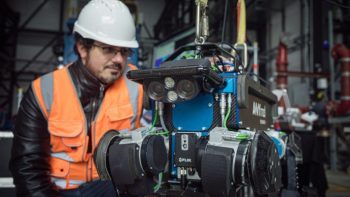The funds will be used to carry out research into expanding robotic safety technologies into new sectors.
Heriot-Watt based ORCA Hub will be expanding its robotics technology research after a generous grant from UK Research & Innovation (UKRI).
Using robotics technology for offshore infrastructure inspection and repair safety is “moving a step closer” following the injection of £2.5 million of further funding.
Six demonstration projects with industrial partners, including the inspection of wind turbine foundations and the deployment of Industrial Internet of Things (IIoT) sensors, will take up £600,000 of the new funding.
The remaining £1.9m will fund an extension of ORCA Hub’s activities to see if technologies and processes developed by the Hub can be used in other sectors, ranging from construction and urban infrastructure to decommissioning and waste management.
Yvan Petillot, professor of robotics and autonomous systems at Heriot-Watt University and co-academic lead of the National Robotarium, has been appointed as the ORCA Hub’s new director.
Commenting on the funding, Professor Petillot said: “Robots have the potential to carry out inspection and maintenance in hazardous environments, reducing the risks of putting divers into the water in harsh conditions or workers operating at height on wind turbines. Finding ways to combine the flexibility of autonomous robots with remote human operators has been one of the key strands in my career over the past 20 years.
“The international offshore energy industry is undergoing a revolution, adopting aggressive net-zero objectives, and shifting rapidly towards large scale offshore wind energy production.”
The ORCA Hub, which includes Imperial College London, Liverpool and Oxford Universities, is supporting energy transition and the growth of renewable energy. It is one of the strategic projects within the National Robotarium.
Working with industry partners, the Hub’s aim is to help the offshore energy industry to use robots to safely inspect, maintain and repair platforms, wind turbines, and other infrastructure, guided by human experts on ships or back onshore.
Professor Petillot continued: “The long-term industry vision is for a digitised offshore energy field, operated, inspected and maintained from the shore using robots, digital architectures and cloud-based processes to realise this vision. However, the recent pandemic has highlighted a widespread need for remote operations in many other industrial sectors.
“The ORCA Hub has built a community of roboticists and expertise during its initial phase. This funding extension aims to accelerate the translation of the research into our existing industry network, working with companies including Wood, EDF and Ross Robotics, while expanding into new sectors by adapting the current research and tackling the novel challenges these sectors bring.”
The National Robotarium recently announced robotics technologies that aim to support workers. Experts at the Robotarium will use the new ‘Spot’ dog robot to carry out research into how robots can support humans in hazardous environments, including offshore energy inspections and disaster recovery.
UK Government Minister for Scotland Iain Stewart said: “Advancements in robotics will be essential to meeting the UK’s ambitious climate targets.
“Robots can help us to reduce waste, safely manage new infrastructures such as solar energy and offshore wind, and better monitor and protect our environment.
“The UK Government is building back better from the pandemic, supporting cutting-edge research across the entire UK and investing £21 million in the National Robotarium as part of the Edinburgh and Southeast Scotland City Region Deal.”
Source: DIGIT

